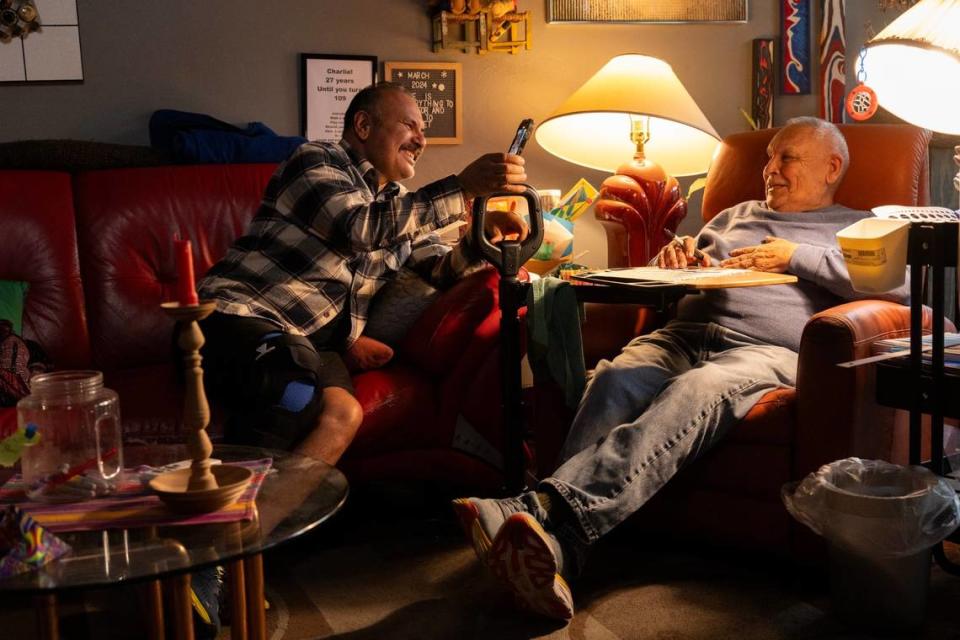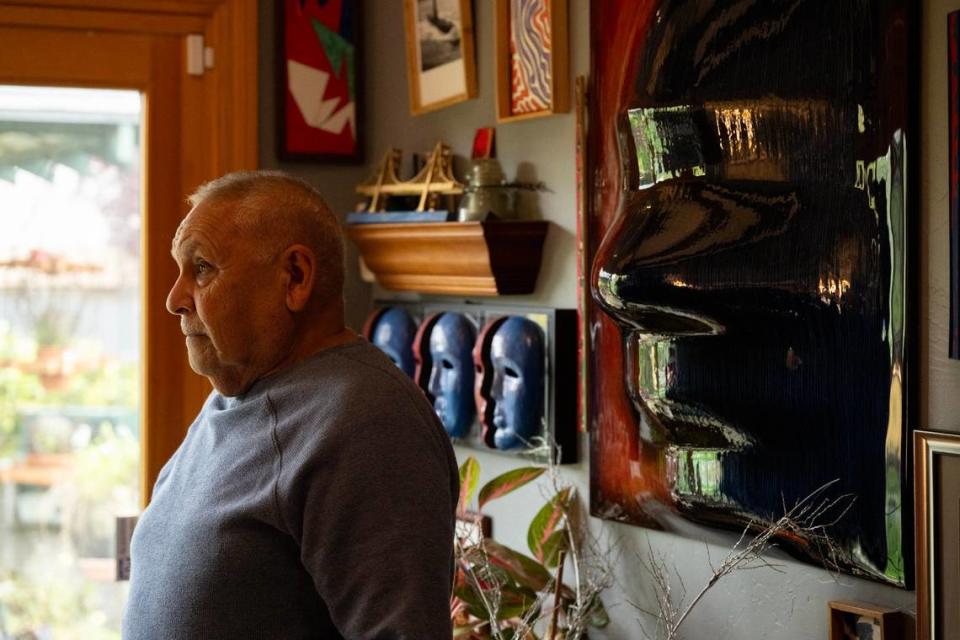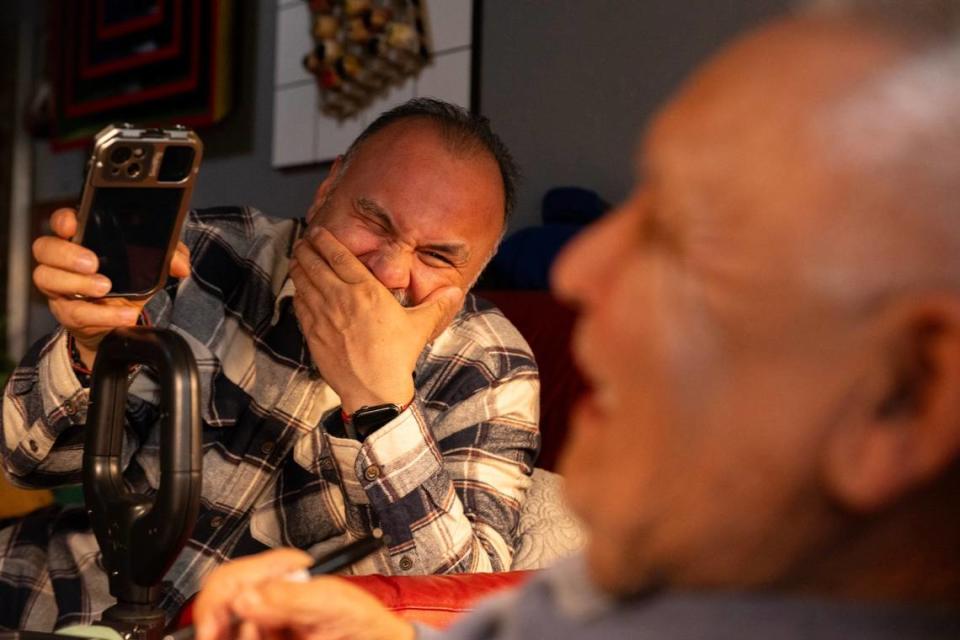Black, Latino, Asian people less likely to receive dementia testing, treatment in US. Why?
Black, Latino and Asian families face significantly more challenges getting either a diagnosis or targeted treatment for a loved one living with dementia than white families do, according to new research.
“If we’re just talking about Black Americans, … we already know that Black Americans are at increased risk for dementia,” said Ladson Hinton, a geriatric psychologist at the University of California, Davis. ”Our study really summarizes … that Black Americans are also, once they get dementia, less likely to get the kind of care that is really optimal.”
Hinton and his team at UC Davis systematically reviewed U.S. dementia study results from the last 10 years, working alongside researchers at the Oregon Health & Science University, to gain a comprehensive picture of what health care access and quality has been like for people living with the condition.
Black and Hispanic American patients were less likely to be referred for neuro-psychological testing to determine the cause of their dementia, the researchers found, and Asian American older adults were less likely to receive a diagnostic work-up to determine whether they were showing signs of the cognitive impairments associated with dementia.
These findings came as no surprise to Elizabeth Edgerly of the Alzheimer’s Association, who said her organization has hired social workers and developed online resources to help because so many people of all races contacted them out of frustration.
Even in the best of circumstances, a timely dementia diagnosis can be elusive, said Edgerly, executive director of the Alzheimer’s Association of Northern California and Northern Nevada.
Four out of five people she meets, she said, will begin by relating how challenging it has been to find out what’s causing their condition or to obtain a referral to a neurologist. In fact, so many people have complained to the Alzheimer’s Association that they encountered skepticism or inertia when they sought testing that the group began offering care consultations to help families navigate the process.
When you add language and cultural differences into this equation, she said, delays in diagnosis could span years if the patient or caregivers aren’t persistent.
A diagnosis eluded this family for more than a year
Carlos Olivas III was in the dark for nearly two years about what was causing his father’s dementia, and he’s still mystified about why his father’s health system didn’t do more outreach to his family.
Olivas left a thriving career in the audiovisual industry in 2016 after receiving a phone call the year before from his dad’s dentist that hit him “like a gut punch.”
“He was concerned about my dad’s overall hygiene,” Olivas said, “and that he was missing appointments or getting lost.”
His now 83-year-old father, Carlos Olivas Jr., had an infection in his gum line, Olivas said, and the dentist said that if he didn’t follow instructions on medication and care, it could lead to heart problems and potentially even brain damage.

Olivas acted quickly to help his father navigate that health crisis while at the same time conferring with his younger brother, Cesareo, on steps they should take to get their father some help for his lapses in thinking, remembering and making judgments.
Two months after the call from the dentist, Cesareo flew back home to Sacramento from North Carolina where he was working as a mechanic on a NASCAR team. He joined their father on a trip to see his primary care doctor, determined to get some answers.
The doctor told him that Olivas Jr. was showing signs of mild cognitive impairment, and he prescribed a medication called Aricept as a way to help slow it down. But he offered no way to diagnose the cause of the problem, Olivas said.
“There was no follow-up from the doctor, and mind you, he had a Latino surname and practiced at one of the major health systems here in Sacramento,” Olivas said. “There was no social worker. … There was no outreach to family members. There were just our names on the advanced care directive.”
A son moves home, determined to get answers
Olivas figured the only way to get answers was to move back to his childhood home, he said, but that brought a whole new set of challenges.
He and his brother had learned so much from their dad. At Sacramento State, Olivas Jr. had provided audiovisual support across the campus, and at home, he tackled auto repair, plumbing, electrical wiring, yard work and more.
Their take-charge dad couldn’t see why he should cede control of his health care or his finances to his kids, said Olivas. By this time, his father was forgetting to pay utility bills, and Olivas and his brother had to rush payment to avoid shut-off.
It was clear his father needed help, Olivas said, but he verbally attacked his son as he attempted to maintain control. Olivas went through “some frustration, some despair, some depression, some anguish,” he said.
After joining some Alzheimer’s Association support groups, Olivas began to understand his father’s behavior better and he also realized he had his own issues: “The reality was I was very uneducated about dignity, about empathy. I had a strong ego and a bad attitude.”

In the support groups, there were lessons about how various forms of dementia affect people. Other caregivers shared their lived experience and the many obstacles they encountered in getting a diagnosis and the right treatment for their loved ones.
Very few of the caregivers in those groups looked like Olivas, he said, but he had much in common with all of them. After months of being pushed away by his father, he said, he finally managed to get the password to the online portal for his dad’s health system.
His father’s primary care doctor had retired about six months after giving them the news of Olivas Jr.’s mild cognitive impairment, and the health system had assigned him a new doctor. When Olivas requested a referral to the system’s memory care team for further testing, the new doctor readily agreed, but an appointment wasn’t available for six to eight months.
Finally, their dad gets a diagnosis and specialty care
It wasn’t until late 2017 when the Olivas family learned Olivas Jr. had Alzheimer’s disease, Olivas said, and finally, the health system assigned them a social worker. His father had been having stomach problems since he began taking Aricept, and they were able to work with a neurologist to refine the dosage for it and relieve that side effect. The neurologist also prescribed an antidepressant for him.
The Aricept has improved Olivas Jr.’s memory and attention, Olivas said, and the antidepressants have lifted his mood. Thanks to the medications, he said, Olivas Jr. reclaimed his love of creative pursuits, producing artwork that they now sell at Artbeat Gallery, 1107 L St..

Olivas volunteers at the gallery, answering questions for shoppers and ringing up purchases, and he said he hopes his family’s story inspires other Latinos to speak up about how dementia is affecting their families and to join support groups where they can gain insights into the disease and treatment.
It takes Hispanic Americans 40% longer to get a diagnosis and Black Americans 11% longer than their white peers, Hinton said.
The health care disparities, however, go beyond testing. Among other findings from the UCD and Oregon Health & Science researchers:
▪ Black Americans with dementia were more likely to have increased hospital admission rates, longer lengths of stay and higher costs.
▪ Among dementia patients who entered long-term care facilities, people of color were less likely to be admitted to specialized memory care units.
▪ Minoritized populations had lower rates of prescriptions for anti-dementia medications..
Oanh Meyer, an associate professor in the UC Davis Department of Neurology, said she and the other researchers are hoping that “understanding where the disparities exist will help us address why they occur and how to remedy them at the individual, clinical and health-system level.”
These agencies can help you navigate the dementia journey
Edgerly said that social workers at the Alzheimer’s Association have helped so many people advocate for care that they have developed scripts and strategies to make the most of interactions with health providers and insurers. The organization has established a 24/7 help line, 800-272-3900, where families can get confidential support.
What people living with dementia also should know, Edgerly said, is that the state of California has established 11 Caregiver Resource Centers around the state — Del Oro Caregiver Resource Center in the Sacramento region — to help families at low or no cost. They offer specialized information and referrals, family consultations, legal help with advance directives, and much more.
If you plan to advocate for diagnostic testing for yourself or a loved, Edgerly said, there are practical steps you should take. Write down examples of how brain function or behavior has changed, what it’s normally like and the things you now struggle to do, she said.
If health providers agree that there are signs of dementia but don’t offer diagnostic testing or a consultation with neurologists, Edgerly said, the patient or a caregiver could ask: “How would one go about getting a diagnosis of Alzheimer’s? What does that process look like? ... How do you do it?”
This prompts providers to think about the standard of care and what the “next steps” are, Edgerly said, but patients can also go to the help and support section of the Alzheimer’s Association website to find what types of testing is recommended.
More tips to get the dementia tests, care you need
Print out that list or call and ask that a brochure be mailed to you, Edgerly suggested, and take that along with you to the doctor.
“Having some things in writing helps a little bit with the awkwardness if you don’t want to be viewed as challenging ... the authority of the doctor,” she said, so instead you can say “the Alzheimer’s Association told me this is the process, right? So I’m ready.”

Sadly, some diagnostic tests may not be available in the primary language that patients speak, Edgerly said, but there are several ways to get answers. New break-throughs also might make it easier in future, she added.
“There are bio-markers that are emerging (for Alzheimer’s) and under FDA review now,” she said, “so when we get to that point, which could happen in the next year or two where there’s a blood test, this will be helped, in theory, tremendously.”
Edgerly said that she uses “in theory” because she’s learned that not all providers may know that new tests exist or offer them even if they do know: “Just when I think we’ve overcome a major barrier, I realize there’s three more barriers right there.”
Assertiveness doesn’t always result in equal access in health care, Edgerly said, and the Alzheimer’s Association social workers can guide patients through available strategies and let them know when it might be best to try a different provider.
For a long time, Edgerly wondered why so many people struggled to learn the cause of their dementia. Then one day, she was speaking with a physician who shared the time crunch he was under: “I get seven minutes: seven minutes if they’re coming in with a runny nose, seven minutes if they think it’s Alzheimer’s. There’s no difference.”

